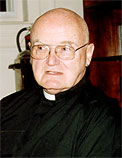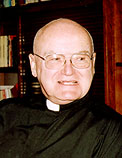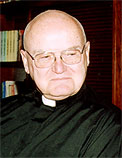|
|
Father Willard Jabusch: “Since you have such diversity and so
many different religions … it’s very hard to present anything
except a kind of smorgasbord of ethical ideas.” Catholic New World photos by Sandy Bertog
Providing guidance at an ‘amoral university’
|
|
|
|
The Interview, a regular feature of The Catholic New World, is an in-depth conversation
with a person whose words, actions or ideas affect today’s Catholic.
It may be affirming of faith or confrontational. But it will always
be stimulating.
|
|
This week, Catholic New World staff writer Michelle Martin talks
with Father Willard Jabusch.
For 11 years, Father Willard Jabusch has directed Calvert House,
the Catholic campus ministry at the University of Chicago. In
March, the Jesuit weekly America published his essay about the
amoral nature of secular universities. Now, just over a month
before he retires to take a position at the American College in
Louvain, Belgium, Jabusch discussed the obligation universities
and students have to the moral development of the next generation.
The Catholic New World: What does the term “the amoral university”
mean?
Father Willard Jabusch: What we don’t mean by it is “immoral university.” That would be
teaching what is wrong. The amoral university doesn’t teach any
kind of ethical system, doesn’t promote any sort of values at
all, so it just stays away from any kind of teaching or guidance
as far as morality is concerned. It would be interested in presenting
data—just get the facts, learn history or science or whatever
it is, and be interested in that, but not especially interested
in what this means for the morality of human beings.
TCNW: I’m skeptical. Is it possible to present any information
without imbuing it with some value?
FWJ: Very difficult to do. In theory, you have the amoral university.
It’s completely disinterested. It’s an objective institution that’s
simply presenting the facts, the data. But in reality, you have
all kinds of different professors here with many individual moral
systems or religions, and they of course would inevitably say
something about what they hold.
TCNW: What do you think a university’s responsibility is to the moral
and ethical development of its students?
FWJ: Well, I think most parents would hope that it was involved
in that in some way. But given this very diverse group of people
who make up a university, with the faculty, the students and the
administration, I think it’s very difficult to do that. At a Catholic
university, you might have more agreement on what this should
be, what is our standard, what are the ethical principles we ought
to have for students. But in a big secular university, whether
it be a state or private secular university like this one, you’re
not going to get a consensus on that.
TCNW: Are the students then responsible for their own moral and ethical
development?
FWJ: In effect, that’s what is the case. That’s why you have some
guidance. There is the Catholic ministry on campus, and that’s
why I think Calvert House and the Sheil Center at Northwestern
and the John Paul II Center at UIC (University of Illinois at
Chicago) are very, very important. It’s not so much a refuge for
the Catholic students to come and hang out, although that’s always
possible. Some have called it an oasis in the midst of an ethical
desert, and I think there’s a lot of truth to that. But at least
in the campus ministries, whether they’re Catholic, Protestant,
Jewish, and now there’s more and more Islam, and Buddhist and
even some Hindus—at least with a campus ministry, you’re going
to have some kind of standard that’s being presented. For us,
it’s the Gospel standard, the way Jesus Christ would want us to
live.
TCNW: Is it difficult to try to relate that message to what students
are studying, since you’re not involved in their academic education?
FWJ: The problems and the issues really are the same. What do I do
with my life? What is really important for me? How do I live as
a committed Christian in the very capitalistic and very selfish,
consumerist, agnostic society? So students, whatever discipline
they’re in, whether it be law, medicine, business, humanities,
physics, the questions very often are the same. They’re the big,
basic questions. Why am I here? What’s it all about? What’s the
place of suffering in the world? How do I live as a father or
mother of a family in the midst of a world that doesn’t value
my Christianity? A very big question, how do I find somebody to
be my wife or my husband who will share some of my basic beliefs?
That’s not so easy. In fact, it’s very difficult.
TCNW: That makes a very large responsibility for the campus ministry,
to try to answer those questions.
FWJ: You do what you can do.
TCNW: It sounds as though you see the idea of the university being
amoral as the best that you can hope for, given its secular nature.
FWJ: I think that is correct. It’s kind of like the blank blackboard,
There’s simply nothing written on it at all as far moral principles
are concerned. Because the Catholic Church stands for a lot of
things that many, many people in academia do not esteem, there
is a tension. We have some wonderful professors who are deeply
committed to promoting what is good, true and beautiful. Others
seem less committed.
TCNW: In your essay, you wrote one of your students said they
don’t talk about ethics in any of his classes. I have difficulty
believing that.
FWJ: Ethical questions are bound to arise in any field, but I think
a lot of professors feel very nervous about presenting their point
of view because they feel that they have to be very objective,
and they just don’t want to say too much.
TCNW: What could be done to make the situation better?
FWJ: I don’t think we can expect the big, secular university to really
do much more than they are doing, which, of course, is not very
much. As far as teaching ethics … ethics come out of religion
usually. Even humanism produces some sort of an ethical system.
Since you have such diversity and so many different religions,
so many different points of view, it’s very hard to present anything
except a kind of smorgasbord of ethical ideas. The student can
pick or choose or avoid the smorgasbord table altogether.
TCNW: Do you feel like you’re a smorgasbord offering?
FWJ: No, because I think the students who come here have already
decided what they want for the main course, and that is Christianity
in the Catholic tradition. Our students who come here are already
convinced about their religious affiliation and are very committed
young people, very perceptive, very bright, very generous.
For more information about Calvert House, visit www.uchicago.edu/aff/calvert/
Front Page | Digest | Cardinal | Interview
Classifieds | About Us | Write Us | Subscribe | Advertise
Archive | Catholic Sites | New World Publications | Católico | Directory | Site Map
|









